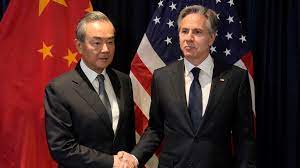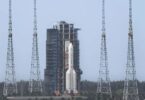The top diplomats of the United States and its fierce competitor the People’s Republic of China set the stage on Friday, for a week-long multi-dimensional crucial talks relating to their sweet and sour relationship between their nations on Friday.
During a meeting at the State Department in Washington DC, Chinese Foreign Minister Wang Yi told his American counterpart Antony Blinken that the United States and China have disagreements and need in-depth comprehensive dialogue to reduce misunderstandings and reset ties. Wang noted that the two countries share important common interests and challenges that need to be resolved together.
In this context, the dialogue would help them reduce mutual misunderstandings, stabilize the bilateral relationship and return to the track of healthy, stable and sustainable development. Meanwhile, Wang’s counterpart fully backed his stance and both sides kicked off their talks to set a course that not only rescues their relationship but maintains peace, and boosts economic cooperation and political stability in the world.
The relationship between the major powers has always been crucial in shaping global politics, resolving regional disputes, maintaining peace and stability and regulating the global economy, and trade. In the contemporary world, the stable relationship and constructive teamwork between two superpowers and long-held competitors are of utmost importance.
The People’s Republic of China (PRC) and the United States are the world’s two largest economies. Their economic relationship has significant global ramifications. Both countries have economic interdependence and rely on each other as trading partners, which impacts global supply chains and trade dynamics. Similarly, both nations hold considerable geopolitical influence and their bilateral relations affect regional and global stability.
Cooperation between them is essential to avoid confrontation in multiple spheres and address global issues like climate change, nuclear proliferation, and counterterrorism. At the same time, both countries have a role to play in regional issues ranging from the Indo-Pacific region to the Middle East, Europe and Africa, while their partnership promotes peace in those areas and their rivalry can cause turmoil in various geographical parts of this universe.
Historically, the US-China ties have increasingly witnessed strategic competition in multiple domains particularly in the areas of technology, military and global political influence together with cybersecurity, intellectual property theft, bilateral trade and market access. Meanwhile, trade and tariffs disputes, human rights, Xinjiang, Taiwan, and Chinese ingress in the South and East China seas are continuous issues between Beijing and Washington amid the quest for teamwork in several avenues such as denuclearization of North Korea, global crusade against climate change, US’s dealing with Iran and resolution of ongoing Israel-Hamas conflict in the Middle East.
Although, there are wide-ranging differences and divergence of interests between the two major global powers. The US and China have exercised restraint and avoided intense competition between the two largest economies despite disagreements on a host of issues including trade, Taiwan and the South China Sea from veering into conflict. Currently, the Israel-Hamas conflict has added a fresh dynamic to the testy relationship of the superpowers, and Washington hopes Beijing can use its influence with Iran to prevent an escalation into a wider war in the Middle East, while US strategist also perceives’ US-China engagement necessary to check Beijing’s cooperation with Russia, Iran and North Korea. In fact, a stable and cooperative relationship between China and the US is vital for addressing global political needs, including economic stability, conflict resolution, and collective responses to global challenges.
Tensions between them can have far-reaching consequences not only for both contenders but in the international arena as well. Presently, both adversaries are engaged in an open competition and their relationship is a mix of sweet and sour, hence, teamwork is a compulsion of both competitors to reach decisive victory.







